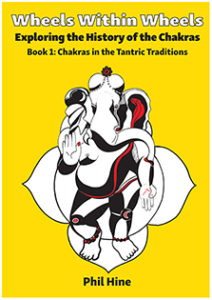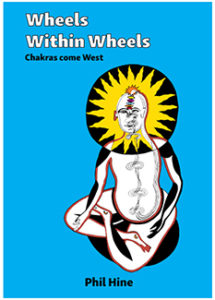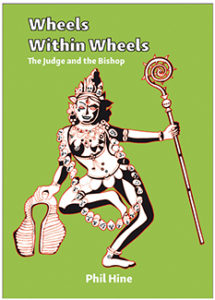Review of Phil Hine’s Wheels Within Wheels Series.

If you are an occultist of any stripe, chances are you know what Chakras are. If you were interested in magic back in the 80’s and 90’s you definitely know what chakras are because they were covered in nearly every book on magic, witchcraft, Kabbalah, or occultism that was on the market, whether it made sense to cover them in the book or not. I still wonder if there was some kind of secret chakra tax-break for publishers in the 80’s. Unfortunately, what was written in those about chakras bore little resemblance to any teachings that originated in India. Like Karma, Tantra, and bland curry – the west put its own spin on it and never looked back to see if they got it right.
How did this happen? Phil Hine knows.
Not only does he know, but he has a pithy way to explain the difference between eastern and western idea ideas of chakras and how this move happened. He gave a series of talks on the topic at Treadwell’s Bookshop in London earlier this year and now has expanded upon those talks in three short books on the topic called “Wheels Within Wheels”.
The first book is subtitled Chakras in the Tantric Traditions. Speaking as someone familiar with a lot of the source material, it is rare to see this material presented so frankly in English. It is refreshing that right from the start Hine places the Chakras in their proper context: a subtle body that includes channels, winds, and points, not just spinning wheels. He exposes the reader to different chakra maps from different systems, showing how the number is not fixed as 7, but variable according to practice. Perhaps most importantly Hine details how deities reside in the Chakras and how the Mantras literally are the goddess or god – a point drummed into anyone that has training in any type of Tantra.
 The second book is subtitled Chakras Come West and focuses largely on the Theosophical society between 1880-1910 and how they evolved to claim the “initiated” interpretation of Indian literature that even Indian teachers did not have. Crowley is also covered in the appropriate amount: not too little, not too much. This in itself is a small miracle when speaking about Crowley because people want to either credit him with the whole of western occultism or deny he had anything important to say at all. Hine simply logs Crowley’s writings on Chakras in and shows how they compared and combined with the understanding of Blavatsky and other writers of the period.
The second book is subtitled Chakras Come West and focuses largely on the Theosophical society between 1880-1910 and how they evolved to claim the “initiated” interpretation of Indian literature that even Indian teachers did not have. Crowley is also covered in the appropriate amount: not too little, not too much. This in itself is a small miracle when speaking about Crowley because people want to either credit him with the whole of western occultism or deny he had anything important to say at all. Hine simply logs Crowley’s writings on Chakras in and shows how they compared and combined with the understanding of Blavatsky and other writers of the period.
 The third book, The Judge and The Bishop focuses on Sir John Woodroffe and Charles Webster Leadbeater, who together represent the first two western authors to write extensively about Chakras in English. It is not much of a stretch to say that everything written in every western occult book on chakras can be traced back to these two authors and hasn’t expanded much on what they wrote 100 years ago. Hine jokes that Woodroffe can be so dense in his writing that he is amazed no one has yet written a “Serpent Power for Dummies” book. Struggling through that book in my 20’s I could have used such a book, and I wish it could be written with the clarity and accuracy that Phil brings to Chakras in these three texts.
The third book, The Judge and The Bishop focuses on Sir John Woodroffe and Charles Webster Leadbeater, who together represent the first two western authors to write extensively about Chakras in English. It is not much of a stretch to say that everything written in every western occult book on chakras can be traced back to these two authors and hasn’t expanded much on what they wrote 100 years ago. Hine jokes that Woodroffe can be so dense in his writing that he is amazed no one has yet written a “Serpent Power for Dummies” book. Struggling through that book in my 20’s I could have used such a book, and I wish it could be written with the clarity and accuracy that Phil brings to Chakras in these three texts.
I learned quite a bit from these short books. More than I expected to be honest. Phil Hine manages to introduce the reader to the unfiltered Indian Tantric teachings, and show how the understanding of Chakras evolved separately from this in the west. Somehow, he does this without denigrating the western understanding or suggesting that it is pointless or ineffective. If you are at all interested in Chakras, you should get your hands on these as soon as possible.
The Wheels Within Wheels series is available from Treadwells Bookshop. The Fourth Book in the series, subtitled Symbols of the Psyche will be published in November 2018.
